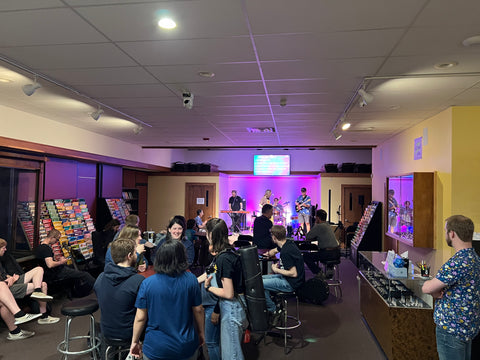Rock School 101 - Ages 9 to 12
Rock School 101 is just like our traditional Rock School but for younger musicians. This program is designed for those students who began studying their instrument at a younger age and have achieved the playing proficiency required to begin a rock band experience. Recommended guidelines for minimum playing skills are provided on the back of the application. This is a great way for younger musicians to begin their initial group experience.
- Age Group: 9-12
- Sessions: 1 ½ hours once a week for six weeks. Days determined by availability on enrollment form.
-
Concert: Weekend
- Fee: $120.00
The next Rock School 101 Program will begin in the fall. Enrollment form available below. Please call for details - 330-673-1525 ask for Gary.
Rock School 101 Enrollment Form
Frequently Asked Questions
Q: What is rock school?
A: Rock School is an opportunity for young musicians, generally ages 13 – 18, to to be in a typical rock band where they learn how to rehearse, put together songs, improve original material, and work together as an ensemble under the guidance of an experienced, professional, rock musician “coach”.
A: It is a goal of Rock School to expand on the participants musical experience and tastes and help them mature as musicians and “team players”.
Q: Who should participate?
A: Rock School is designed for intermediate and advanced musicians, usually ages 13 – 18, who have taken at least a year of private lessons. In order to handle the level of difficulty of most rock music, students should have studied and have a playing proficiency of:
Guitar
- Can play power Chords anywhere on the fingerboard
- Can play a number of Major and Minor Chords (Open Chords and Barre Chords) i.e. E A D G Bm
- Can play a variety of scales (Particularly the major scales and blues scales)
- Know the names and ability to tune the open strings (EADGBE)
- Is familiar with TAB or other notation
- A good idea of how to find a note by name on the fingerboard
- Some experience listening to recordings in order to pick out and learn certain parts “by ear”.
- Has a solid sense of tempo and rhythm
Drums
- Student has studied and performed on a regular drum set
- Can play a dozen or so different rock patterns
- Is comfortable switching tempos with different patterns
- Is experienced incorporating fills and kicks into the patterns
- Understands thoroughly the role of keeping time and playing behind the band
- Some experience listening to recordings in order to pick out and learn certain parts “by ear”.
Keyboards
- Is familiar with scales and major keys – especially those commonly used in rock music. i.e. G D E
- Can create and voice major chords in various keys
- Can play blues scales and chord progressions in a number of keys
- Can create and voice a few minor chords in various keys
- Can play melodic lines with the right hand
- Can replicate bass lines and chords being performed by other instruments in the band
Don't Forget About Singing
Most of the great rock music requires a vocalist. Our general expectation for young rockers is that you don’t have to be an experienced singer….just be willing to try. Very few rock singers are trained musicians. Singing is lot more fun than you may think…and we’ll help you. Get out front and “go for it.”
(If these terminologies and experiences are unfamiliar, a prospective rock school student may wish to consider private lessons, or additional study before attempting to participate in a rock school band.)
Q: What music will be played?
A: If a group of musicians sign up as a band the emphasis for rehearsals will be to develop and enhance their existing material and introduce new songs that they agree as a group should be added to their song list.
A: If participants sign up as individuals, or otherwise incomplete groups, the emphasis of the rehearsals will be to democratically select music with the newly created group in a manner which at least partially addresses the likes of all members. Compromise will undoubtedly be necessary. However, the caliber of musicianship and ability to play a particular piece of music will take precedent over an individual or several individuals desire to play a particular song. It is the role of the Coach to help assist and guide the group in ultimately determining the type music, and specific repertoire that the group can successfully handle.


